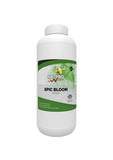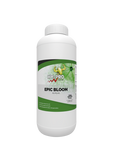Hy-Pro Epic Bloom Terra
Hy-Pro Epic Bloom Terra
PLANTS NEED ADDITIONAL SUPPORT WHEN FLOWERING
For plants to grow and develop flowers and fruit, they need a balanced source of 20 mineral elements. The six main nutrients essential to healthy and fruitful plant development are carbon, hydrogen, oxygen, nitrogen, phosphorus and potassium. The first three are in air and water, and the last three must come from the soil. Additional major elements plants need in large amounts include calcium, magnesium and sulfur. If your fast growing plants don’t get the quantities they demand, energy production is hampered and your plants find it difficult producing the energy necessary for heavy bud and flower development. Plant growth halts and fruit and flower quality suffers. To achieve a plentiful harvest, a flowering booster composed with extra phosphorus, potassium, sulphur and a blend micronutrients can make a huge difference.
** EXTRA PHOSPHORUS FOR PHOTOSYNTHESIS
HY-PRO Flowering boosters provide plants with extra phosphorus for photosynthesis.
Although phosphorus is also necessary during the plant’s growth period, it is much more involved in the flowering stage. Phosphorus is an essential nutrient both as a part of several key plant structure compounds and as a catalysis in the conversion of numerous key biochemical reactions in plants. Phosphorus is noted especially for its role in capturing and converting the sun’s energy into useful plant compounds. Phosphorus is a vital component of ATP, the “energy unit” of plants involved in transporting and storing energy. Phosphorus is also a vital component of DNA, the genetic “memory unit” of all living things. It is also a component of RNA, the compound that reads the DNA genetic code to build proteins and other compounds essential for plant structure, seed yield and genetic transfer. The structures of both DNA and RNA are linked together by phosphorus bonds.
**EXTRA POTASSIUM FOR HEALTHY PLANTS
HY-PRO Flowering boosters provide extra potassium for healthy crops and plants.
Potassium is a catalyst for many plant functions and is essential in nearly all processes needed to sustain plant growth and reproduction. Potassium helps form strong stems, improves colour, provides starches and oils and reduces water needs. It is essential for cell division and balances the effects of excess nitrogen and calcium. Potassium is also involved in the regulation of water and the transport of the plant’s reserve substances. It increases photosynthesis capacity, strengthens cell tissue, and stimulates flowering and the synthesis of carbohydrates and enzymes. Plants deficient in potassium are less resistant to drought, excess water, and high and low temperatures. They are also less resistant to pests, diseases and nematode attacks. Because potassium improves the overall health of growing plants and helps them fight against disease, it is known as the “quality” nutrient. Potassium affects quality factors such as size, shape, color and vigor of the seed or grain, and improves the fiber quality of cotton.
EXTRA SULPHUR FOR PROTEIN SYNTHESIS
HY-PRO Flowering boosters provide plants with extra sulphur for protein production
Sulfur participates in the formation of chlorophyll. It is necessary for performing photosynthesis and intervenes in protein synthesis and tissue formation. Sulfur is part of every living cell and required for synthesis of certain amino acids (cysteine and methionine) and proteins. Sulfur is also important in photosynthesis and crop winter hardiness. In addition, sulfur is important in the nitrate-reductase process, during which nitrate-nitrogen is converted to amino acids. Sulfur is required for the synthesis of vitamins, and is a constituent of certain amino acids, which are the building blocks from which proteins are created. Without proteins, plants wither and die.
ADDITIONAL MICRONUTRIENTS FOR FLOWERING RESULTS
Beyond the essential nutrients responsible for healthy plant growth and development, plants also need micronutrients, which assist in fruit and flower production. For example, boron aids in cell wall formation and calcium uptake, as well as flowering, pollen germination and fruiting. Iron is necessary for healthy development of all parts of young growing plants. Manganese enables respiration and nitrogen metabolism, and zinc is required for stem growth. Molybdenum and nickel are both needed for healthy seed formation and germination, and silicon improves stem strength.









